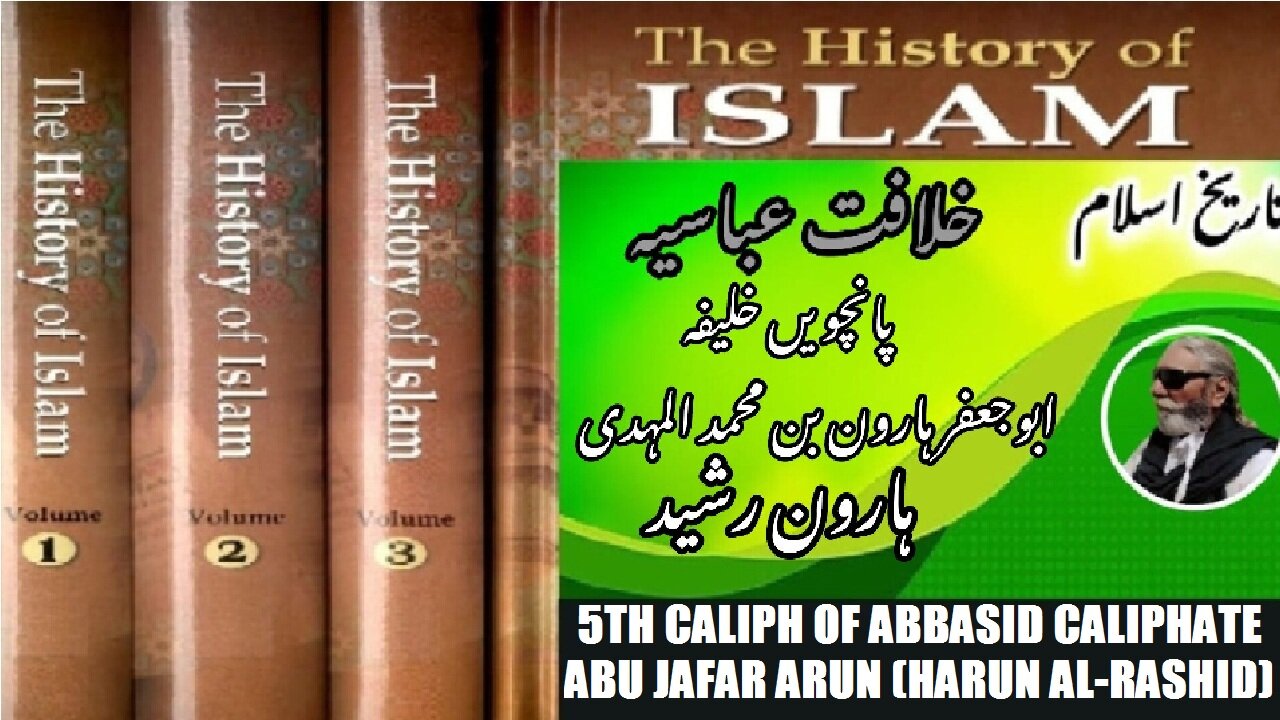Premium Only Content

5th Caliph of Abbasid Caliphate Abu Jafar Harun ibn Muhammad al-Mahdi Harun al-Rashi
@islamichistory813 #abbasidcaliphate #fifthcaliph #abujafararunibnmuhammadalmahdi #harunalrasid
Fifth Caliph of Abbasid Caliphate Abu Jafar Harun ibn Muhammad al-Mahdi famously known as Harun al-Rashid
Asslamoalaikum sisters brothers friends and elders, we discribing the extraordinary journey of the Fifth Caliph of the Abbasid Caliphate, Harun al-Rashid, also known as Abu Jafar Harun ibn Muhammad al-Mahdi. Discover the influential legacy of one of the most iconic figures in Islamic history, whose reign marked the pinnacle of the Islamic Golden Age. This video will provide you with in-depth knowledge about his contributions to culture, science, and the expansion of the empire. Share this enlightening video with friends and family to spread the wisdom!
Abu Jafar Harun ibn Muhammad al-Mahdi famously known as Harun al-Rashid, was the fifth Abbasid caliph of the Abbasid Caliphate, reigning from September 786 until his death in March 809. His reign is traditionally regarded to be the beginning of the Islamic Golden Age. His epithet al-Rashid translates to "the Orthodox", "the Just", "the Upright", or "the Rightly-Guided".
Harun established the legendary library Bayt al-Hikma ("House of Wisdom") in Baghdad in present-day Iraq, and during his rule Baghdad began to flourish as a world center of knowledge, culture and trade.[1] During his rule, the family of Barmakids, which played a deciding role in establishing the Abbasid Caliphate, declined gradually. In 796, he moved his court and government to Raqqa in present-day Syria. Domestically, Harun pursued policies similar to those of his father Al-Mahdi. He released many of the Umayyads and 'Alids his brother Al-Hadi had imprisoned and declared amnesty for all political groups of the Quraysh.[2] Large scale hostilities broke out with Byzantium, and under his rule, the Abbasid Empire reached its peak.[3]
A Frankish mission came to offer Harun friendship in 799. Harun sent various presents with the emissaries on their return to Charlemagne's court, including a clock that Charlemagne and his retinue deemed to be a conjuration because of the sounds it emanated and the tricks it displayed every time an hour ticked. Portions of the fictional One Thousand and One Nights are set in Harun's court and some of its stories involve Harun himself.[7] Harun's life and court have been the subject of many other tales, both factual and fictitious
H?r?n was born in Rey, then part of Jibal in the Abbasid Caliphate, in present-day Tehran Province, Iran. He was the son of al-Mahdi, the third Abbasid caliph (r. 775–786), and his wife al-Khayzuran, (a former slave girl from Yemen) who was a woman of strong and independent personality who greatly and determinedly influenced affairs of state in the reigns of her husband and sons. Growing up Harun studied history, geography, rhetoric, music, poetry, and economics. However, most of his time was dedicated to mastering hadith and the Quran. In addition, he underwent advanced physical education as a future mujahid, and as a result, he practiced swordplay, archery, and learned the art of war.[8] His birth date is debated, with various sources giving dates from 763 to 766.[9]
Before becoming a caliph, in 780 and again in 782, H?r?n had already nominally led campaigns against the caliphate's traditional enemy, the Eastern Roman Empire, ruled by Empress Irene. The latter expedition was a huge undertaking, and even reached the Asian suburbs of Constantinople. According to the Muslim chronicler Al-Tabari, the Byzantines lost tens of thousands of soldiers, and Harun employed 20,000 mules to carry the riches back. Upon his return to the Abbasid realm, the cost of a sword fell to one dirham and the price of a horse to a single gold Byzantine dinar.[10]
Harun's raids against the Byzantines elevated his political image and once he returned, he was given the laqab "al-Rashid", meaning "the Rightly-Guided One". He was promoted to crown prince and given the responsibility of governing the empire's western territories, from Syria to Azerbaijan.[11]
Upon the death of his father in 785, Harun's brother al-Hadi became caliph. However, al-Hadi's reign was brief: a year and two months. Al-Hadi clashed with their mother over her great influence in court. The historian al-Tabari notes varying accounts of al-Hadi's death, e.g. an abdominal ulcer or assassination prompted by his own mother.
Harun's first wife was Zubaidah. She was the daughter of his paternal uncle, Ja'far and maternal aunt Salsal, sister of Al-Khayzuran.[34] They married in 781–82, at the residence of Muhammad bin Sulayman in Baghdad. She had one son, Caliph Al-Amin.[35] She died in 831.[36] Another of his wives was Azizah, daughter of Ghitrif, brother of Al-Khayzuran.[37] She had been formerly married to Sulayman ibn Abi Ja'far, who had divorced her.[36] Another was Ghadir also known as Amat-al-Aziz, who had been formerly a concubine of his brother al-Hadi.[37] She had one son Ali.[35] She died in 789.[37] Another wife was Umm Muhammad, the daughter of Salih al-Miskin and Umm Abdullah, the daughter of Isa bin Ali. They married in November–December 803 in Al-Raqqah. She had been formerly been married to Ibrahim ibn al-Mahdi, who had repudiated her.[36] Another wife married around the same year was Abbasa, daughter of Sulayman ibn Abi Ja'far.[36] Another wife was Jurashiyyah al-Uthmanniyah. She was the daughter of Abdullah bin Muhammad, and had descended from Uthman, the third Caliph of the Rashidun.[36]
Harun's earliest known concubine was Hailanah. She had been a slave girl of Yahya ibn Khalid, the Barmakid. It was she who begged him, while he was yet a prince, to take her away from the elderly Yahya. Harun then approached Yahya, who presented him with the girl. She died three years later[38] in 789–90,[39] and Harun mourned her deeply.[38] Another concubine was Dananir. She was a Barmakid, and had been formerly a slave girl of Yahya ibn Khalid. She had been educated at Medina and had studied instrumental and vocal music.[40] Another concubine was Marajil. She was a Persian, and came from distant Badhaghis in Persia. She was one of the ten maids presented to Harun. She gave birth to Abdullah (future caliph Al-Ma'mun) on the night of Harun's accession to the throne, in September 786, in whose birth she died. Her son was then adopted by Zubaidah.[35] Another concubine was Qasif, mother of Al-Qasim. He was Harun's second son, born to a concubine mother. Harun's eldest daughter Sukaynah was also born to her.[41]
Another concubine was Maridah. Her father was Shabib.[42] She was a Sogdian, and was born in Kufah. She was one of the ten maids presented to Harun by Zubaidah. She had five children. These were Abu Ishaq (future caliph al-Mu'tasim), Abu Isma'il, Umm Habib, and two others whose names are unknown. She was Harun's favourite concubine.[43] Some other favourite concubines were, Dhat al-Khal, Sihr, and Diya. Diya died much to Harun's sorrow.[44] Dhat al-Khal also known as Khubth[45] and Khunth,[46] was a singer, belonging to a slave-dealer who was himself a freedman of Abbasah, the sister of Al-Rashid. She caught the fancy of Ibrahim al-Mausili, whose songs in praise of her soon reached Harun's attention, who bought her for the enormous sum of 70,000 dinars.[47] She was the mother of Harun's son, Abu al-Abbas Muhammad.[45][47] Sihr was mother of Harun's daughters, Khadijah[47] and Karib.[48] Another concubine was Inan. Her father was Abdullah.[49] She was born and brought up in the Yamamah in central Arabia. She was a singer and a poet, and had been a slave girl of Abu Khalid al-Natifi.[50] She bore Harun two sons, both of whom died young. She accompanied him to Khurasan where he, and, soon after, she died.[51]
Another concubine was Ghadid, also known as Musaffa, and she was mother of Harun's daughters, Hamdunah[52] and Fatimah.[48] She was his favourite concubine.[52] Hamdunah and Fatimah married Al-Hadi's sons, Isma'il and Ja'far respectively.[53] Another concubine was Shikl. She was the mother of Abu Ali.[54] She was purchased by Al-Rashid along with another girl named Shadhr[55] also known as Sukkar.[45] When Shadhr became pregnant and had a child named Umm Abiha,[54] Shikl grew envious of her. This jealousy escalated to the point where it became widely known. Later, Shikl herself became pregnant and gave birth to Abu Ali. Despite the deaths of both mothers, the animosity between Abu Ali and Umm Abiha persisted.[55] Another concubine was Hilanah. She had been formerly a concubine of his brother al-Hadi.[56]
Another of Harun's concubines was the captive daughter of a Greek churchman of Heraclea acquired with the fall of that city in 806. Zubaidah once more presented him with one of her personal maids who had caught his fancy. Harun's half-brother, while governor of Egypt from 795 to 797, also sent him an Egyptian maid who immediately won his favour.[57] Some other concubines were namely: Ri'm, mother of Salih; Irbah, mother of Abu Isa Muhammad; Sahdhrah, mother of Abu Yaqub Muhammad; Rawah, mother of Abu Sulayman Muhammad; Dawaj, mother of Abu Ali Muhammad; Kitman, mother of Abu Ahmad Muhammad; Hulab, mother of Arwa; Irabah, mother of Umm al-Hassan; Rahiq, mother of Umm Salamah; Khzq, mother of Umm al-Qasim; Haly, mother of Umm Ja'far Ramlah; Aniq, mother of Umm Ali; Samandal, mother of Umm al-Ghaliyah; Zinah, mother of Raytah;[58] Qaina;[59] Shajw.
A major revolt led by Rafi ibn al-Layth was started in Samarqand which forced Harun al-Rashid to move to Khorasan. He first removed and arrested Ali bin Isa bin Mahan but the revolt continued unchecked. (Harun had dismissed Ali and replaced him with Harthama ibn A'yan, and in 808 marched himself east to deal with the rebel Rafi ibn al-Layth, but died in March 809 while at Tus).[68][69] Harun al-Rashid became ill and died very soon after when he reached Sanabad village in Tus and was buried in Dar al-Imarah, the summer palace of Humayd ibn Qahtaba, the Abbasid governor of Khorasan. Due to this historical event, the Dar al-Imarah was known as the Mausoleum of Haruniyyeh. The location later became known as Mashhad ("The Place of Martyrdom") because of the martyrdom of Imam al-Ridha in 818. Harun al-Rashid and his first Heir, prince al-Amin (Al-Amin was nominated first heir, Al-Ma'mun second and Al-Qasim was third heir.) After Harun's death in 809 he was succeeded by Al-Amin.
We pray to Allah Almighty to give us permission to read Quran wa Hadith and also permit us to read, understand our Islamic history. Ameen Allah Hafiz
===================================================
-
 2:14:54
2:14:54
TheSaltyCracker
2 hours agoTrump Goes Gangster ReeEEeE Stream 01-26-25
55.8K149 -
 LIVE
LIVE
Due Dissidence
11 hours agoTrump Calls To "CLEAN OUT" Gaza, Swiss ARREST Pro-Palestine Journalist, MAGA's Hollywood Makeover?
3,252 watching -
 2:02:20
2:02:20
Nerdrotic
4 hours ago $12.23 earnedDECLASSIFIED: JFK, MLK UFO Immaculate Constellation Doc | Forbidden Frontier #089
53.4K3 -
 3:00:14
3:00:14
vivafrei
12 hours agoEp. 248: "Bitcoin Jesus" Begs Trump! Rekieta Gets Plea Deal! Pardons, Deportations, Bird Flu & MORE!
104K113 -
 3:44:06
3:44:06
Rising Rhino
10 hours ago $11.78 earnedWashington Commanders Vs Philadelphia Eagles: NFL NFC Championship LIVE Watch Party
46.2K3 -
 13:00
13:00
Exploring With Nug
5 hours ago $3.83 earnedHe Went To Get A Haircut And Vanished WIthout a Trace!
34.3K1 -
 18:53
18:53
DeVory Darkins
1 day ago $26.35 earnedTrump JUST ENDED Mayor Karen Bass During HEATED Meeting
70.3K211 -
 21:06
21:06
Russell Brand
9 hours agoIT'S COMING
125K343 -
 21:26
21:26
Stephen Gardner
1 day ago🔥What JUST leaked out of Congress must be STOPPED NOW!
127K275 -
 53:25
53:25
tether
11 days agoStability and Freedom in Chaos: The Story of Tether USD₮ | Tether Documentary (USDT)
140K5